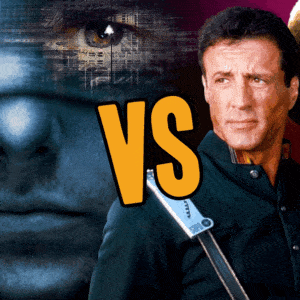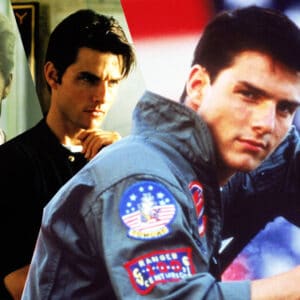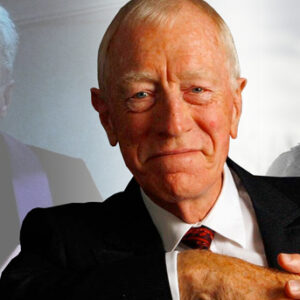Last Updated on May 31, 2022
As they were about to sit down at their predetermined location, a table about 10 feet from the closest person, Tom Cruise and Steven Spielberg looked at each other and wondered if they need to be so far away. With little fanfare, two of the most powerful men in Hollywood put their drinks down, picked the table up and moved it mere inches away from where I was sitting. “Much better.” I began to think this wasn’t going to be the interview I expected. That suspicion was confirmed shortly thereafter when Cruise, who couldn’t resist the opportunity to warm up the crowd, launched into a goofball “testing, testing…is this thing on” routine culminating in that laugh we’ve come to know so well.
I’d hear that laugh often in the next thirty minutes. Being around 5:00pm, this likely was their last stop on today’s promotional tour around New York City, but you’d never know by the way these two work. Cruise beams his smile and flirts gently with every girl in the room. Spielberg takes the time to personalize the proceedings by offering up gems like his love for a certain website that starts with a J, ends with an O and has a OBL in the middle (Yep, that’s right! Click here to read about and actually hear how Spielberg loves JoBlo.com!). I’ve interviewed my share of celebs but I never expected these two, who really don’t need to do much to sell MINORITY REPORT, to be so, for lack of a better word, nice. The two genuinely seemed to be having fun. And although I’m supposed to remain objective as a journalist, as I engage in conversation with Tom Cruise (?!?!), I can’t help but have fun too…
Do you think there is such a thing as a predetermined future and if so, is there a danger to knowing too much about it?
SS: I think…it’s almost a religion. The future – is it predetermined or can you make the choice? Can you control your own destiny? I think it’s a matter of individual belief. There are times that I believe that everything is out of my control and I’m following a preordained path. And there are other times when I feel more in power and a lot better about myself and I feel real feisty and could take the world by storm and I’m the one writing my own script about life. And I’ll tell you, that I go back and forth depending on my mood.
TC: [to reporter] Do you want me to add something to this? [Reporter nods.] I’d like to know about the future. I like the questions that this picture poses. Is it fate or do we have choices? I believe we have choices and that we do contribute to the end – the final story of our lives. But also you look at…I’m interested in the future. And that was exciting cause Steven said – I want to make this movie fifty years in the future. I’m gonna create a world and what’s it gonna be like? Something that an audience can identify with but that’s not too far off. – and I’m fascinated by that.
MINORITY REPORT, VANILLA SKY and your [motioning to Spielberg] A.I. all seemed to have similar themes like reality is something that is subjective. Is this a coincidence that you guys seemed to come together at this point to make this film when you’re both dealing with similar themes?
SS: I don’t quite see the similar themes because I think in MINORITY REPORT, the reality is clear. There are no alternate realities in MINORITY REPORT nor where there alternate realities in A.I. There’s a time sequence in all those films. VANILLA SKY was delicious because you had to figure out where you were at all times. But I think that movies that mess with the brain are movies that I’m hungry for right now. I’m hungry for something where I can take my brain to the movies as well as my stomach for the fast tips and turns and the fast movie ride. At the same time I want something substantial. As I get older I sort of demand substance and that’s what I tried to do with MINORITY REPORT.
I noticed a real Brian DePalma feel with the shots through the tunnel, over the rooms, different angles of the murders, Jessica Harper’s in it at the end…
SS: Well Brian DePalma and I both learned from the same teacher: Alfred Hitchcock.
TC: [Big laugh]
How much can you allow public response to one project affect what you do in the next one? Is it something that you have to protect yourself from or is it something that you will literally go and make changes?
SS: Well it depends. If you’re talking about responses from making a movie and previewing it…are you talking about previews?
Well I’m talking in general. Box-office, critical…
SS: That doesn’t effect me. It never really did. I was never really concerned with that. It doesn’t affect my next movie, whether I’m coming off of a hit or as the film that wasn’t perceived as one. It doesn’t change my mind about a movie I’m working on. I don’t say, Oh! I need a hit to follow-up a film that didn’t make any money!
TC: You never know what’s gonna do well.
SS: You never know until the last minute. We’re gonna be OK here cause we have the tracking but you never know how long it’ll last. I make movies. I don’t really…I’m one of the few people that doesn’t read what the box-office is Monday or Tuesday after the weekend. I’m more concerned about whether the movie was any good not whether it’s making any money.
TC: It really comes down to you don’t know what’s going to do well, you don’t know what’s going to happen. So you just have to go and think, Do I like this story? Do I want to make this movie? So you invest the time and you hope the studios make their money back and get a better return on the movie than they would’ve if they’d invested their money in a bank. Because there is that responsibility that we have. But none of the choices are based on that. Working with Steven, I’ve known him for so long, and then all of the sudden to be working with him and to see his instincts just take him. He’s obviously a gifted, gifted storyteller. It’s all from the point-of-view of the story and what interests him. And what was “the buzz” for us. You never know what’s gonna happen afterwards and you just kind of find this thing, get excited about it and you want to make it. [Pause] Did that answer your question?
Janusz Kaminski does such great work on your films. Did you have a particular favorite shot in this movie?
SS: Well, there’s this one shot that I’m really fond of. You know, I set my camera and Janusz lights the shot which is our relationship, that’s how we shoot film together. My job, really, is to tell the story through the camera. Janusz’s job is to come in and find ways of lighting it so the lighting tells the story as well. And the shot that is a great combination of camera placement, lens choice and lighting is one shot where Agatha, played by Samantha Morton, is in Anderton’s, played by Tom Cruise…he’s embracing her. She’s looking over her shoulder and he’s saying “I need to know, I need to find out about my life” and she’s saying “Leave. Leave.” It’s those two profile shots that I have a fondness of.
TC: Yeah, I love that. It was Samantha’s first day of shooting and she showed up and she’s like lightning in a bottle when she came in. I remember, [turns to Spielberg] remember when she did one take and we went behind the set and went [starts pumping his fist]. High-fiving each other cause she was just on fire. [Everyone laughs.]
Did you like working with her?
TC: Oh, she’s incredible.
SS: She’s like a silent movie actress.
TC: She’s incredible. An amazing face. Very powerful actress. But that profile shot, I remember we were just…Steven goes through and he stages beautifully for actors and their behavior. So we’re going through and he goes…because you didn’t even see that set beforehand. You looked at it in pictures but you wanted to come in and he likes getting his ideas…he works very quickly because he understands his story and his lenses so well. It’s exciting cause you can find the staging and it stages beautifully. And I remember when you found that profile shot immediately it was just I want you to shoot this and you’re shirt to shirt with Samantha. I love that shot. I love that shot. Hopefully that’ll become part of the ad because it’s so…
SS: That’s actually gonna be one of the ads after we open this. We’re post-opening changing the newspaper ads.
TC: If I could say also that when you look at a film like this that’s got a tremendous value, production value, yet those shots…that particular moment with two characters that are both going in completely different directions. It’s character, it’s story. You think, how many times can you find a profile shot? It was exciting, not just cause it’s a great shot, it’s also telling a story in there. And that’s what excited me. He’s got…incredible…visual……[now intentionally slowing down his voice] abilities,……Mister…… Spielberg. [Everyone laughs.]
[A reporter stands and introduces himself from Yahoo!]
TC: [doing his impersonation of the Yahoo! commercials] Yaa-hoooooooooo! [Everyone laughs.]
SS: I have to tell you something Steve. You’re name is Steve, right?
Yes.
SS: I can remember that. I had dinner with the founder of Yahoo! about seven years ago in Japan. I had my son who was now sixteen but was much younger then. I took him to a teahouse and we had geishas serving us tea and I had a little sake… We started talking and he kept sitting across from me and saying, YAHOO! You have to know Yahoo! And he was going crazy over this thing called Yahoo. And I thought he was actually insane. [Everyone laughs.] He kept talking about Yahoo! and I thought he was trying to say Yah-hoo! And he was but I had no idea what he was building. And he was so thrilled with what was happening in his world, and this was WAY beyond my world at that time, and I looked back and thought God, if I had been a little bit nicer to that guy…[Everyone laughs]…he might’ve called me up and offered me a chance to invest.
I’ll try to get that anecdote in the company newsletter. What took you guys so long to get together and could you kind of chart the near misses?
SS: I think we always knew we would work together cause when I first me Tom on the set of RISKY BUSINESS, I knew I wanted to direct him in a movie. I just know that I was patient and Tom was patient cause we knew it was inevitable. It’s gonna happen and it’s not gonna happen cause we force it to happen. It’s gonna happen cause something just felt right. In this case, something happened that I felt was right; I felt it was right for me and Tom felt it was the right thing for him. But we’ve come close a couple times but we felt really, really good about this one.
[To Tom] Do you have anything you’d like to add on?
TC: [thinks hard] No. [Everyone laughs.] That’s exactly how I feel.
SS: I’m like a pre-cog! I knew I felt something! [Everyone laughs.]
Tom, Steven has referred to your performance as a “slow smolder the way Bogey used to be when contemplating danger.” Do you feel you were feeling a slow smolder in this movie?
TC: You see the character is…Steven and I talked about that. You had to have all that undercurrent underneath and yet just not see it coming but to just be there. It’s part of your character that starts out. He’s got a tremendous amount of loss and that’s got to be there. That’s the emotional trust. Personally as an actor, as we were going through it, I loved Steven’s choices with me as an actor. How he directed me into that performance. And it was a lot of fun for me. But it needed that…here’s a guy who’s the leader of men and women trained in an elite force and it just needed that undercurrent. When it happened you had to understand why he did what he did.
This is more of a darker role for you. Is that important?
TC: Yeah, I’ve never played a dark role before and I was very excited to have the opportunity. I’m joking, that was a joke. Not a good one apparently. Not a good one…[Everyone laughs.] But, listen I love this character and I love characters like this. And to make a film with all that eye-candy and to then have this story. I like humor in movies and Steven kept coming to me with ideas like the eyeballs and all those things…the sandwich…the milk. All those things. It was fun for that character to have those things. I like the complexity of this character. As an actor to have a role like that but with everything else it’s rare. It’s hard to find and the story really wanted that and Steven really wanted that for this picture. You could go down one way with this film or the other. You really want it to have this kind of tense kind of story. I was excited about it. Sorry for the terrible joke, by the way.
Steven, what are the challenges to setting a movie in the future and for Tom, what are the challenges to acting in a movie in the future?
SS: The challenge of setting a movie in the future is not to be futuristic. For me it was trying to be levelheaded about it and trying to bring it as close to our reality as possible. Cause I really don’t think in fifty years, when you think back from 1950 – 2002 the changes are profound as far as information collecting and the internet and certainly space travel, but we haven’t gone very far. We don’t know that much more than we knew in 1950. There’s not a lot of changes.
Transportation has changed but we’re still driving on four wheels. We got a big leap in this movie. We actually got a Mag-Lev system; a magnetic levitation system that doesn’t burn fossil fuel. I’m trying very hard to get away, because there is a closet environmentalist inside of me that is screaming to get out and I have a few messages in MINORITY REPORT to that regard. So I felt like I wanted to set this in a future where we could all say, yeah, that’s feasible. Not like “The Jetsons” but instead like this could really happen. So I was able to gather talented forces and put together a symposium of futurists from all across the nation who came and spoke to me about what their view of the future would be. They were very practical thinkers and I took off the top a lot of their ideas they had offered me at the symposium to try and give you a sense about what their professional thinking is about what the future will be like in thirty years.
So there won’t be any flying cars?
SS: We don’t have flying cars but you can see them in EPISODE 2: ATTACK OF THE CLONES.
You guys have found a perfect movie to work together on but Steven, if you could look back at Tom’s resume and say I really would’ve liked to have directed that movie and Tom, likewise for Steven, you would’ve liked to starred in one of his movies, which one and why?
TC: The way technology’s going today, I’ll put myself in every one of your films. Actually, when I saw JAWS as a kid, I don’t know what you were like, but I know I just lived it. I wanted to be those characters. I remember that. And I certainly wanted to get on that bike with E.T. And then there’s, when you become an actor and start learning about it, you know more about film and you look inside what it takes to tell a story and performance. For me, I’m just so pumped that I could make this right now.
SS: Looking back…
TC: Would you like to be Joel Goodson? [Laughs.] On the train with Rebecca?… [Everyone laughs.] That’s the character you’d want to play?
SS: Yes! That’s a good part! But are you asking me if I were an actor or as a director?
Director. Like, you would’ve wanted to direct JERRY MAGUIRE for instance.
SS: You know, I think I would’ve loved to have directed JERRY MAGUIRE because it’s one of my favorite films that Tom Cruise is in. But thank goodness it wasn’t me. Thank goodness it was Cameron Crowe that really understood that character and wrote it from his heart, created it and just made it. Basically I think, in a sense, it made those guys on ESPN acceptable to the nation. You watch a conference on ESPN and you think Oh yeah, Jerry Maguire, we understand that. But that was one of my favorite movies in terms of like a power pack of a film. The energy was just extraordinary.
Tom, if you could just talk about your character in the film and both of you just share some insight into the mind of Philip K. Dick and adaptations into films from his short stories and his vision into our justice system especially considering the climate of our country…
TC: Yeah, it’s prophetic. You read it and it’s just gripping. You have the ability to recognize in the future crime rates and where they’re going, it’s not good obviously. You look at graphs…The whole idea of being able to predict murders before they happen and try to prevent them. It’s a great character, the character wasn’t like this in the short story. For me, here’s a guy who trains an elite group of people in precrime trying to prevent crimes from happening and he absolutely believes in what he’s doing.
As the story unfolds it begins the moral dilemma when he finds out…well I don’t want to give too much away. It’s a great role. Philip K. Dick, you look at his stories, the reason they’re being made…I’ve read his other stuff but what grabbed me about this is that. That aspect of it. How prophetic it was. I mean look where we are today. On the internet…surfing around the web and people doing character profiles seeing how they can market to you and cameras that are going on the streets now in New York and Washington. There’s a program that they’re developing that’s gonna detect human behavior. The computer will be able to spot terrorism in airports and anything else.
SS: What they’re looking for is anomalies in behavior. They’re gonna get a mean average of how people behave when they’re simply walking down the street at a crosswalk and they’re gonna compare that to people whose behavior is more erratic. The problem with that is and what’s obstructive about that is a nerd like me who does have a weird walk and doesn’t exactly look like the norm, suddenly I imagine guns being pulled on me as I’m pulled into a van and taken to an interrogation room.
Like in MINORITY REPORT, not every system is different and it also makes me a little frightened of the powers that be to able to observe us. What happens when this crisis passes and we finally have a handle on terrorism and we feel safe on the home front? All these expansive powers that we’ve now given the FBI and the CIA to have to protect us with, are we, once this crisis passes, gonna have to say, now give it back to us the way it was before 9/11? And that’s what we’re gonna have to be strong as a county, as a people. We suspended our privileges and personal freedoms to be able to protect all of us and all our children, but now that that’s passed can we have all our personal freedoms back the way they were before? And you feel like that maybe is not gonna happen.
TC: I’d love that but it becomes the norm. Once you get that machine going it is a dilemma because we need it but on the other hand I don’t really think the public realizes what they’re gonna be giving up in terms of their personal freedom.
SS: I believe that the public certainly getting eye-scanned and advertisers calling you by your first and last name who are trying to solicit you to buy their goods and that’s fine. That’s happening when those cookies show up on our computer screens. On the same token, just understand that we are gonna allow that to happen because we as a social species, we like interaction. We want to be included. We want to watch TV but we also want to have what’s on TV watch us. We want to be a part of “Survivor” and part of these event shows. We don’t want to be left out as spectators. We want to be eventized ourselves. And that has cast approval to put on more technology to look deeper into our private lives. I’m sort of assuming, even though we’re going to protest this in a number of years, right now we’re saying shouldn’t we all be a part of this? We want to interact and be a part of this.
Tom can you describe your experience working with iconic directors like Steven Spielberg and Stanley Kubrick?
TC: They’re both very different directors but I have to say something else. For me I was looking forward and hoping this would happen cause we were good friends and it is…I loved working with Stanley and that was very challenging and a unique time in my life…it was different. Steven’s been my friend for so many years and to have the ability and this chance to work with him was, I can just say, the greatest experience ever. Just extraordinary. Something that I’d like to do again.
SS: Hire me again! [Everyone laughs.]
TC: It was extraordinary. I loved it.
Steven, will there be a fourth INDIANA JONES?
SS: Yes sir, there will be. There was always gonna be a fourth INDIANA JONES starting about four years ago. And then we weren’t able to agree on a story. We finally have a story and Frank Darabont’s gonna write it and we’ll start shooting in May or June of 2004 and it’s gonna be out on the July 4th weekend of 2005. The only thing that’ll change that is the unforeseen. But Harrison’s committed, George has committed, I’ve committed, Frank’s committed and we’re all really gung-ho to do it.
Sean Connery?…
SS: Uh…there’s a huge bunch of spoilers I don’t want to give away now but…yes.




















Follow the JOBLO MOVIE NETWORK
Follow us on YOUTUBE
Follow ARROW IN THE HEAD
Follow AITH on YOUTUBE